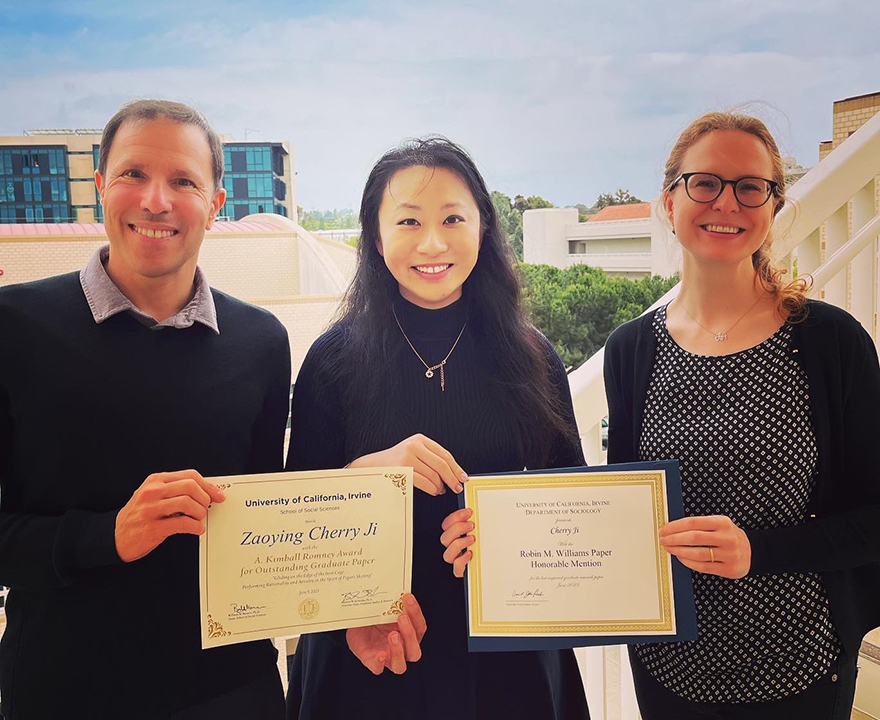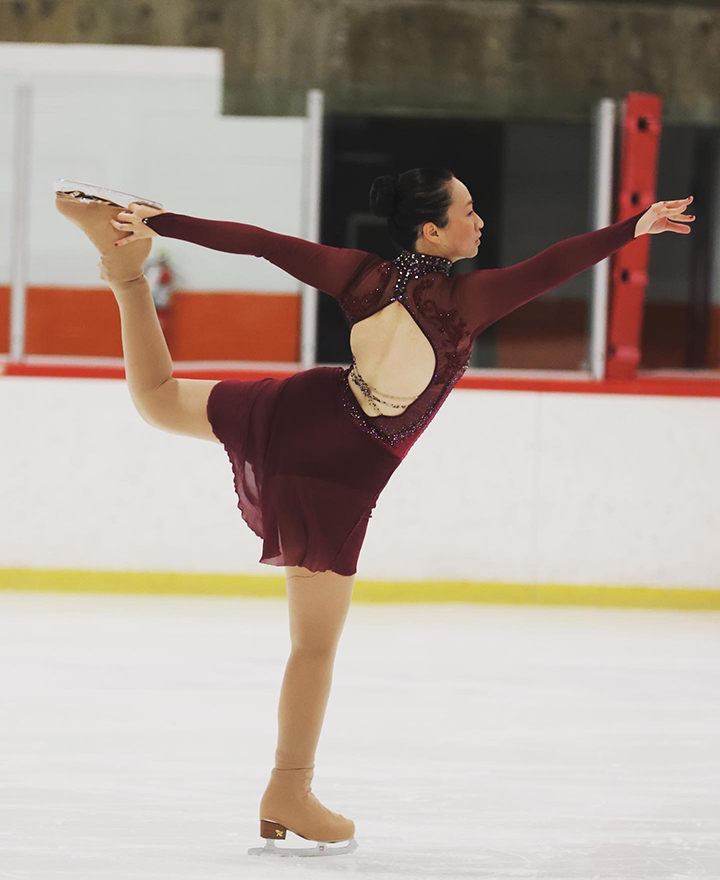Balancing blades and books

Balancing blades and books
- September 25, 2023
- Cherry Ji, UCI Department of Sociology Ph.D. candidate, has spun her passion for figure skating into award-winning research

"I'm broadly interested in educational inequality. That's the big picture," says Cherry Ji, a Ph.D. candidate in UCI's Department of Sociology.
Her dissertation is a quantitative, cross-national examination of how the landscape of higher education has evolved over time in terms of its gender makeup. "Overall, women's participation in higher ed is growing," she says. "But we still see some persistent inequality when we break it down by different fields of study." Using enrollment data from UNESCO and the World Bank, Ji looks at how cultural discourses around the world have shaped women's participation in postsecondary education and the ways in which women's roles and participation in the public sphere have evolved over time.
It may be surprising, then, to learn that Ji's research isn't limited to education. But that's what makes her a true Anteater. "Cherry's work is a great fit for UCI sociology as it straddles multiple areas of departmental strength, from the sociology of culture to comparative sociology to education and gender," says Julia Lerch, one of Ji's advisors.
Case in point? Ji has found a way to use her passion for figure skating as a jumping-off point for her academic work. She has another line of research, within cultural sociology, that focuses on the social performance of artistry in Olympic figure skating — that is, how figure skaters present themselves in competition to showcase their artistry amid increasingly rationalized evaluation systems.
"It's definitely becoming a trend where evaluations become more quantified and rationalized,” she says. “So I wanted to sort of explore that with figure skating as a case study."
Having grown up in cosmopolitan Beijing, Ji was interested in how skating brings together people from vastly different national and cultural backgrounds. "I felt really lucky to be able to experience different cultures from a young age," says Ji, who competed in international youth competitions around Asia. "Skating was definitely a window for me to see the outside world."

As a child, Ji immediately felt at home on her blades. "From the first time I stepped on the ice, I didn't have any fear," she recalls. "I didn't have to hold on to things." She trained intensely between the ages of 10 to 12, before taking a long break. In 2014, she moved to upstate New York to attend Vassar College. After earning her bachelor's degree in educational studies with honors, she decided to relocate to California for her PhD.
"UCI’s sociology department is definitely one of the best in the country," says Ji. "It's always been one of my top choices." But Ji was even more drawn to how passionate faculty members are about mentoring the next generation of sociologists and how much they co-author with students. "That's not always the case in any Ph.D. program."
In late 2018, around the time she started her grad program, a $110 million Olympic-level training facility happened to open in Irvine. It felt fateful. "I actually came back to skating when I started grad school at UCI," she says. "It was meant to be for me to come back to the sport."
The next spring, Ji began taking lessons with Alexa Knierim, a world champion and one of the most acclaimed figure skaters of her generation. Under Knierim’s tutelage, Ji has won competitions across Southern California, and she was ranked first in her division in the SoCal Interclub Series. It was Knierim who inspired Ji to start interviewing the 40 U.S. and international Olympic skaters she ultimately spoke with. Earlier this year, Ji won the A. Kimball Romney Award for Outstanding Graduate Paper for the qualitative, interview-based paper she published on the topic.
"She has a knack for getting her hands on unique data," says Lerch. "She's versatile and marshals both qualitative and quantitative methodologies in her work. Perhaps most importantly, her work speaks to large-scale social trends — such as quantification and the advent of mass higher education — that are fundamentally transforming societies worldwide."
Ji is quick to credit her success to her mentors, who also include UCI sociologists Nina Bandelj, Francesca Polletta, and Evan Schofer. "I am very blessed to be able to work with them," she says. "I obviously wouldn't be where I am today without their guidance and support."
Currently, Ji is collaborating with Bandelj on an economic sociology project to investigate how educational investment reflects and perpetuates persistent inequality. "We have a paper that's looking at basically how mortgages are leveraged as a financial means to afford public education," explains Ji. "Given the rise of intensive parenting as a moral imperative in U.S. society, we are looking at how parents employ mortgage as an educational investment to place their children into high-performing school districts, and how much such financial instruments burden households across income groups."
Ji is also working with Schofer and Lerch on a line of research that builds on — and complicates — her dissertation. They are exploring how the rise of illiberal reactions may curtail women’s progress in education, as well as how attacks on academic freedom have a particularly salient effect in diminishing college enrollment in the social sciences around the world.
As an incoming sixth-year grad student, she's also thinking about her own future in academia. "A postdoctoral fellowship will give me time to really focus on my research, get things out for review and for publication, and hopefully gain some teaching experience as well," says Ji.
After that? She hopes to get a faculty position in sociology or a related field, such as education. "My goal is to stay in academia," she says. "I have barely scratched the surface working on research projects that I am passionate about."
She is excited to progress as a scholar and to continue examining issues surrounding social progress and inequality. "I aspire to establish myself as a well published sociologist and a dedicated mentor like the faculty members at UCI who have made a huge difference in my Ph.D. journey."
-Alison Van Houten for UCI Social Sciences
-pictured: Ji showcases her talents on the ice and in her Ph.D. program. Pictured
with mentors Evan Schofer and Julia Lerch.
Would you like to get more involved with the social sciences? Email us at communications@socsci.uci.edu to connect.
Share on:
Related News Items
- UCI sociologists earn American Sociological Association honors, leadership roles
- Multiple honors for UCI soc sci's Maricela Bañuelos
- Ji earns Romney Award for work examining Olympic figure skaters' social performance of artistry under an increasingly rationalized judging system
- Attending the National Conference for Black Political Scientists
- A lesson in solidarity


connect with us: